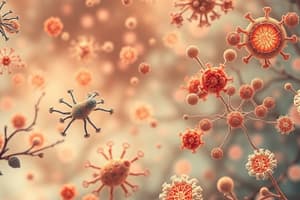Podcast
Questions and Answers
What is the primary characteristic that makes a molecule an effective antigen?
What is the primary characteristic that makes a molecule an effective antigen?
- High molecular weight
- Ability to induce an immune response on its own
- Structural complexity
- Foreignness to the host (correct)
Which of the following is NOT a property that makes a molecule a more effective antigen?
Which of the following is NOT a property that makes a molecule a more effective antigen?
- Larger molecular mass between 5,000 and 100,000 daltons
- Parenteral route of administration
- Ability to induce an immune response on its own (correct)
- Stable molecular structure
What is the main difference between high molecular weight and low molecular weight antigens?
What is the main difference between high molecular weight and low molecular weight antigens?
- Low molecular weight antigens are proteins or polysaccharides, while high molecular weight antigens are not
- Low molecular weight antigens have a molecular mass between 5,000 and 100,000 daltons, while high molecular weight antigens do not
- High molecular weight antigens can induce an immune response on their own, while low molecular weight antigens cannot (correct)
- High molecular weight antigens are more immunogenic than low molecular weight antigens
What is the main function of an antigenic determinant or epitope?
What is the main function of an antigenic determinant or epitope?
Which of the following is NOT a factor that determines the antigenicity of a molecule?
Which of the following is NOT a factor that determines the antigenicity of a molecule?
Why are incomplete antigens or haptens unable to induce an immune response on their own?
Why are incomplete antigens or haptens unable to induce an immune response on their own?
What is the primary function of MHC class I molecules?
What is the primary function of MHC class I molecules?
What is the structure of an MHC class I molecule?
What is the structure of an MHC class I molecule?
What is the primary function of MHC class II molecules?
What is the primary function of MHC class II molecules?
What is the structure of an MHC class II molecule?
What is the structure of an MHC class II molecule?
Which T cell type is activated by MHC class I molecules?
Which T cell type is activated by MHC class I molecules?
Which T cell type is activated by MHC class II molecules?
Which T cell type is activated by MHC class II molecules?
What are the two types of antigenic determinants described in the text?
What are the two types of antigenic determinants described in the text?
Which type of antigenic determinant is mainly recognized by T cells according to the text?
Which type of antigenic determinant is mainly recognized by T cells according to the text?
What is the chemical nature of antigens described as being very good immunogens in the text?
What is the chemical nature of antigens described as being very good immunogens in the text?
Which type of antigen has entered the body from the outside, for example by inhalation, ingestion, or injection?
Which type of antigen has entered the body from the outside, for example by inhalation, ingestion, or injection?
What are the examples of bacterial antigens mentioned in the text?
What are the examples of bacterial antigens mentioned in the text?
Which type of antigen is described as being poorly immunogenic?
Which type of antigen is described as being poorly immunogenic?
Which of the following is the mechanism by which immature dendritic cells take up large molecular or microbe antigens?
Which of the following is the mechanism by which immature dendritic cells take up large molecular or microbe antigens?
Which receptor-mediated process is used by macrophages to take up low levels of particulate or soluble antigens?
Which receptor-mediated process is used by macrophages to take up low levels of particulate or soluble antigens?
Which of the following is the first step in antigen processing?
Which of the following is the first step in antigen processing?
Which MHC molecule is involved in the presentation of exogenous antigens to CD4+ T cells (Th)?
Which MHC molecule is involved in the presentation of exogenous antigens to CD4+ T cells (Th)?
Where does the association of peptides with MHC class II molecules take place?
Where does the association of peptides with MHC class II molecules take place?
Which of the following receptors are involved in the uptake of exogenous antigens?
Which of the following receptors are involved in the uptake of exogenous antigens?
Which of the following best describes the effect of superantigens on T-cells?
Which of the following best describes the effect of superantigens on T-cells?
Which of the following statements about superantigens is correct?
Which of the following statements about superantigens is correct?
What is a key difference between conventional T-dependent antigens and superantigens?
What is a key difference between conventional T-dependent antigens and superantigens?
Which of the following bacterial toxins are examples of superantigens?
Which of the following bacterial toxins are examples of superantigens?
What is a requirement for T-cell response to microbial antigens?
What is a requirement for T-cell response to microbial antigens?
What is the primary reason for the systemic toxicity caused by superantigens?
What is the primary reason for the systemic toxicity caused by superantigens?
Flashcards are hidden until you start studying




